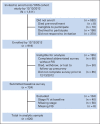Prospective study of fertility concerns and preservation strategies in young women with breast cancer
- PMID: 24567428
- PMCID: PMC4164759
- DOI: 10.1200/JCO.2013.52.8877
Prospective study of fertility concerns and preservation strategies in young women with breast cancer
Abstract
Purpose: Most research regarding fertility in young women with breast cancer has focused on long-term survivors. Little is known about how fertility concerns affect treatment decisions or fertility preservation strategies at the time of initial cancer diagnosis.
Patients and methods: As part of an ongoing prospective multicenter cohort study, we surveyed women with newly diagnosed early-stage breast cancer at age ≤ 40 years. The baseline survey included sociodemographic, medical, and treatment data as well as a modified Fertility Issues Survey, including fertility concern and preservation items. Univariable and multivariable modeling were used to investigate predictors of greater fertility concern.
Results: Among the first 620 eligible respondents included in this analysis, median age was 37 years (range, 17 to 40 years); 425 women (68%) discussed fertility issues with their physicians before starting therapy, and 319 (51%) were concerned about becoming infertile after treatment. Because of concerns about fertility, four women (1%) chose not to receive chemotherapy, 12 (2%) chose one chemotherapy regimen over another, six (1%) considered not receiving endocrine therapy, 19 (3%) decided not to receive endocrine therapy, and 71 (11%) considered receiving endocrine therapy for < 5 years; 65 (10%) used fertility preservation strategies. Greater concern about fertility was associated with younger age, nonwhite race, not having children, and receipt of chemotherapy.
Conclusion: Many young women with newly diagnosed breast cancer have concerns about fertility, and for some, these substantially affect their treatment decisions. Only a minority of women currently pursue available fertility preservation strategies in this setting.
Conflict of interest statement
Authors' disclosures of potential conflicts of interest and author contributions are found at the end of this article.
Figures
References
-
- Siegel R, Naishadham D, Jemal A. Cancer statistics, 2012. CA Cancer J Clin. 2012;62:10–29. - PubMed
-
- Howard-Anderson J, Ganz PA, Bower JE, et al. Quality of life, fertility concerns, and behavioral health outcomes in younger breast cancer survivors: A systematic review. J Natl Cancer Inst. 2012;104:386–405. - PubMed
-
- Partridge AH, Ruddy KJ, Gelber S, et al. Ovarian reserve in women who remain premenopausal after chemotherapy for early stage breast cancer. Fertil Steril. 2010;94:638–644. - PubMed
-
- Sukumvanich P, Case LD, Van Zee K, et al. Incidence and time course of bleeding after long-term amenorrhea after breast cancer treatment: A prospective study. Cancer. 2010;116:3102–3111. - PubMed
-
- Abusief ME, Missmer SA, Ginsburg ES, et al. The effects of paclitaxel, dose density, and trastuzumab on treatment-related amenorrhea in premenopausal women with breast cancer. Cancer. 2010;116:791–798. - PubMed
Publication types
MeSH terms
Grants and funding
LinkOut - more resources
Full Text Sources
Other Literature Sources
Medical
Research Materials


